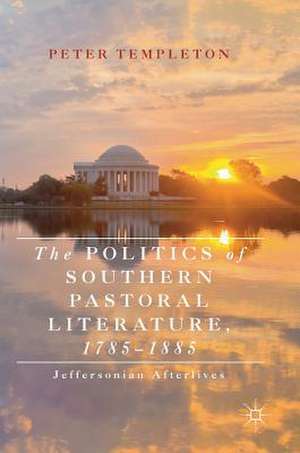The Politics of Southern Pastoral Literature, 1785–1885: Jeffersonian Afterlives
Autor Peter Templetonen Limba Engleză Hardback – 12 ian 2019
Preț: 500.91 lei
Preț vechi: 589.31 lei
-15% Nou
Puncte Express: 751
Preț estimativ în valută:
95.86€ • 104.09$ • 80.52£
95.86€ • 104.09$ • 80.52£
Carte tipărită la comandă
Livrare economică 23 aprilie-07 mai
Preluare comenzi: 021 569.72.76
Specificații
ISBN-13: 9783030048877
ISBN-10: 303004887X
Pagini: 242
Ilustrații: IX, 249 p.
Dimensiuni: 148 x 210 mm
Greutate: 0.46 kg
Ediția:1st ed. 2019
Editura: Springer International Publishing
Colecția Palgrave Macmillan
Locul publicării:Cham, Switzerland
ISBN-10: 303004887X
Pagini: 242
Ilustrații: IX, 249 p.
Dimensiuni: 148 x 210 mm
Greutate: 0.46 kg
Ediția:1st ed. 2019
Editura: Springer International Publishing
Colecția Palgrave Macmillan
Locul publicării:Cham, Switzerland
Cuprins
Introduction: The Pastoral Ideal of Thomas Jefferson.- The Pastoral Double Plot of Swallow Barn.- The Cavalier Cartography of The Kentuckian in New-York.- Strange Temporality of Pastoral in The Partisan Leader.- John Esten Cooke and Democratic Pastoral.- Domestic Pastoral in The Holcombes.- Joel Chandler Harris and the Pastoral of the New South.- Conclusion.
Notă biografică
Peter Templeton is Fellow of the School of the Arts, English and Drama at Loughborough University, UK.
Textul de pe ultima copertă
In The Politics of Southern Pastoral Literature, 1785–1885: Jeffersonian Afterlives, Peter Templeton presents a wide-ranging and systematic evaluation of pastoral in the nineteenth-century Southern novel, offering an explicit appraisal of the philosophical and political rationale of pastoral literature alongside the existing body of research into the image of Jefferson following his death. Rather than assuming a homogeneous South, Templeton locates Southern pastoral in its specific political context, offering readings of significant factors such as the literary representation of landscape, of class and the yeoman ideal, and the institution of slavery and its intellectual underpinnings. Focusing on a six key Southern authors, both canonical and relatively understudied, the book charts key transformations in the politics of pastoral literature in the period, and noteworthy reconfigurations in the representation of Jefferson and his philosophies, in order to analyze whatthese signified to nineteenth-century Americans. In doing so, the text also demonstrates how ideologies react to the stresses imposed on them by political realities.
Caracteristici
Illuminates Jefferson’s cultural afterlife Traces and complicates the history of the Southern pastoral novel Extends scholarship beyond pastoral tropes to deeper our understanding of the Antebellum South and its literature
